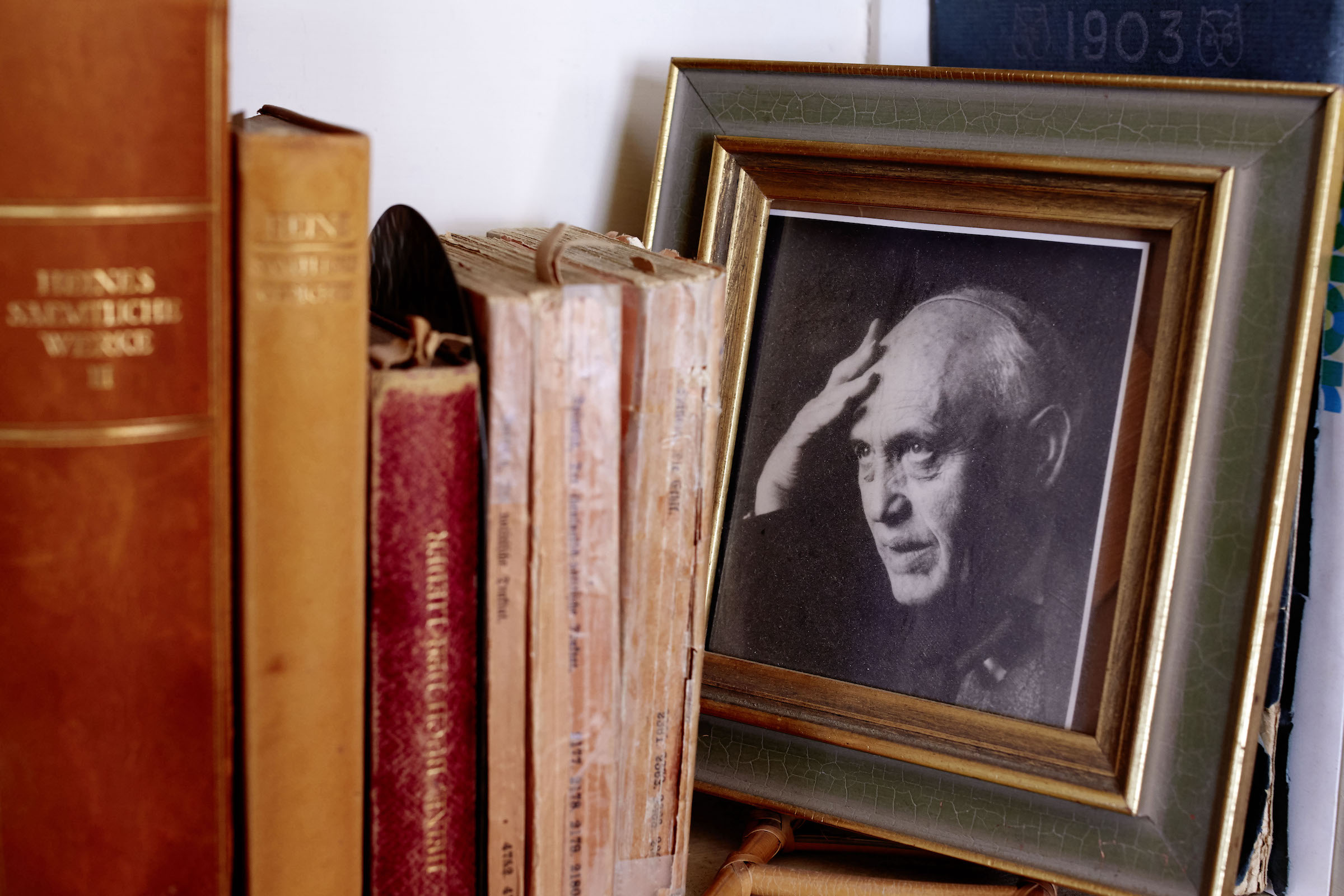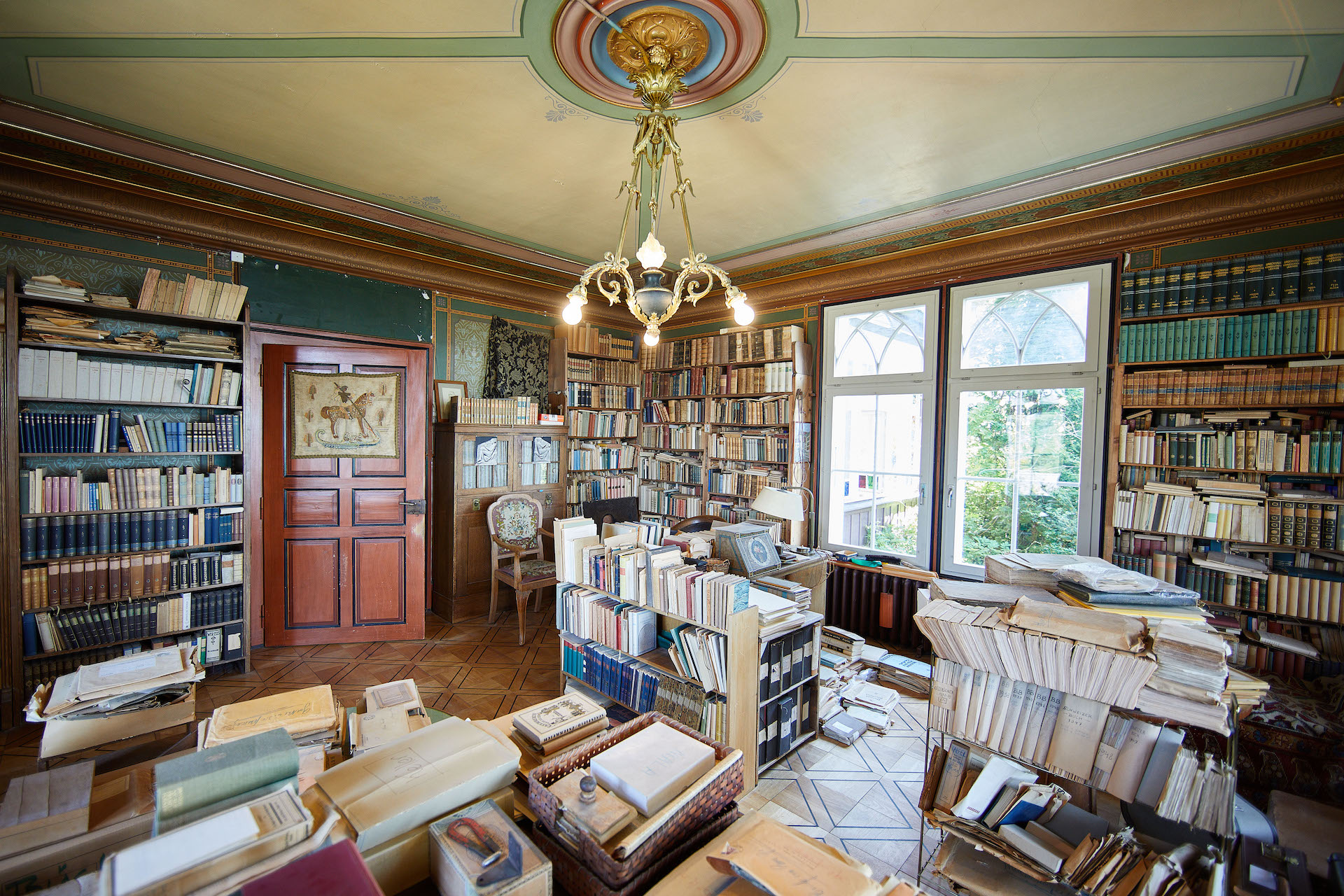"Cryptophilology." Jonas Fränkel's "Underground Science" in Historical and Political Context

The research project at the intersection of literary studies and science studies is dedicated to the Jewish philologist Jonas Fränkel, whose extensive estate and library were recently made accessible. It is being carried out in collaboration between the Chair of Literary and Cultural Studies at ETH Zurich, the Swiss Literary Archives in Bern and the Walter Benjamin-Kolleg at the University of Bern.
Head of research at ETH Zurich: Prof. Dr. Andreas Kilcher
Head of Research at the University of Bern: PD Dr. Irmgard Wirtz
Jonas Fränkel – born 1879 in Krakow, died 1965 near Thun - was an outstanding Swiss literary scholar of the 20th century. After initial studies in Vienna, he immigrated to Switzerland around 1900 and continued his studies in Bern, where he earned his doctorate, habilitated and became associate professor of German literature in 1921. He emerged as an editor of works and letters by German-language writers, among them Goethe, Heine, Gottfried Keller and Carl Spitteler. And he wrote fundamental scientific and political texts on philology. During his decades of extremely productive work as a literary scholar in Switzerland, he was in contact with a large number of important writers and scholars.

However, his academic work, especially after 1933, was situated in a historical-political context that increasingly affected him - as a Jewish scholar. Thus, from 1923 to 1939, he prepared a large part of the 22 volumes of the first critical edition of Gottfried Keller's works for printing. When, in 1939, he criticised National Socialism in his Gottfried Keller's Political Mission, the publishers of the Keller Edition worried about sales on the German market. After a legal dispute, Fränkel was deprived of the edition in 1942 and denied access to the archives. Fränkel suffered a similar fate in his work with and on the poet Carl Spitteler (1845-1924), Switzerland's first winner of the Nobel Prize for Literature. The two had been close friends since 1908 and worked together productively. Fränkel played a major role in Spitteler's later texts as well as in his success, including the award of the Nobel Prize for Literature in 1919. Spitteler envisaged him as administrator of his estate, editor of his collected works and author of his biography. But – advised by leading Swiss Germanists - Spitteler's daughters broke with Fränkel after Spitteler's death. The Swiss Confederation, which received the Spitteler estate as a gift in 1933 as the first literary estate ever, tried to implement the daughters' contractual terms through legal action, to keep Fränkel away from the material and from the plan for a complete edition, and to assemble the parts of Spitteler's estate.
This dark chapter in Swiss German studies can be illuminated with the newly accessible, very extensive archive holdings, which are being made accessible at the Swiss Literary Archives (SLA) in Bern. Against this historical-political background, too, the project is about exploring Fränkel's concept and practice of philology in terms of literary studies and the history of knowledge. In cooperation with the SLA and the Walter Benjamin Kolleg at the University of Bern, the aim is to analyse Fränkel's philological conception and practice of scholarship in a historical and political context, based on his legacy.
Methodologically, this is done with the help of the concept of the "cryptic". On the one hand, this is derived from the fact that Spitteler had created a "crypto-archive" with Fränkel, i.e. (significant) parts of the Spitteler estate have been preserved in the Fränkel estate. What is considered a terminus technicus in archiving for (hidden) archival holdings in foreign estates is to be heuristically extended to Fränkel's philology in general within the framework of the project. It can be considered "cryptic" because its philological principles as well as its working techniques are designed for a transtextual understanding of hidden (biographical as well as work-aesthetic) textual references. Fränkel's extensive library, which is an essential and integral part of the estate, should also be understood from this point of view; numerous books contain inserts (such as letters) and traces of reading, which make the library a "genizah", a repository of the second order, and as such should also be researched. The concept of the crytpical also has a historical-political aspect, in that Fränkel had to increasingly move away from the official discipline for reasons of contemporary history and politics, and his working methods thus often took place in secret, which is why Fränkel himself also spoke of an "underground science" in reference to his work.

The project includes, on the one hand, the complete indexing of the estate and, on the other hand, its research in the form of three doctoral theses, among other things. These are dedicated to the following three focal points of Fränkel's "crypto-philology":
Sub-project A ("Crypto-philology") is dedicated to Fränkel's concept of philology and its historical anchoring on a epistemological level, and to the social and political embedding of his philological work on a sociological level.
Sub-project B ("Krypto-Bibliothek") is devoted to Fränkel's encyclopaedic practice of collecting and arranging as well as to the construction of material deposits of knowledge in the books of his library, which functions as a crypto-archive and crypto-studio of the edition philologist.
Sub-project C ("Krypto-Werk") is devoted to Fränkel's covert collaboration in the network around Carl Spitteler, organised as it was away from proper German studies, which took place in a field of tension between the caesura of the First World War and the process of social modernisation.
These sub-projects are united by the fact that, in precise, praxeologically grounded and reflective work with a wealth of archival material accessible for the first time, they aim to give Swiss philology in crisis a depth of focus that research has so far been unable to achieve. At the same time, they analyse central concepts from philology and literary studies as well as their epistemic conditions on a structural macro-level and thus contribute to contemporary as well as current theoretical reflections within literary studies. In addition to the dissertations, a collective monograph is therefore to be produced that foregrounds this aspect and attempts to do justice to Fränkel's intellectual horizon as well as his long-term impact.
Further information on the work on the estate of Jonas Fränkel:
external page Taking over the estate of Jonas Fränkel with Kryptonachlass Carl Spittelers [in German] – 22.04.2021
external page Online workshops on Jonas Fränkel – April and October 2021
external page Scientific Workshop "Before the Public" – 5 & 6 May 2022
Contributors to the project:
Andreas Kilcher (ETH)
external page Irmgard Wirtz (SLA und WBK Uni Bern)
external page Joanna Nowotny (SLA)
external page Magnus Wieland (SLA)
external page Lucas Gisi (SLA)
Felicitas Pfister (SLA/ETH)
Fabienne Suter (ETH)
Severin Lanfranconi (ETH)
external page Malte Spitz (SLA/Uni Bern)
external page Sandra Raguz (SLA/Uni Bern)
Fabienne Ziegler (ETH/SLA)
Natalie Reusser (ETH/SLA)